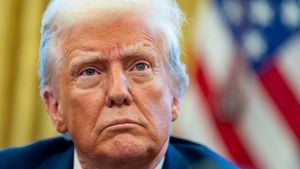The Trump administration's plans to close the U.S. Agency for International Development (USAID) have escalated concerns among international aid workers and foreign diplomats. Recently, prominent tech entrepreneur Elon Musk, during a live session on the social media platform X, discussed the potential shutdown of USAID, marking a significant shift in U.S. foreign policy guidance.
According to Musk, President Trump is on board with his assessment of USAID as ineffective and beyond repair. "What we have is just a ball of worms," he remarked, emphasizing the need for drastic measures against the agency, which oversees humanitarian and development programs worldwide.
The declaration came after it was reported late Sunday evening, following new directives within the agency, where hundreds of employees found themselves locked out of their systems. Staff members were informed to stay out of the USAID headquarters on February 3, as the agency’s leadership prepared for unprecedented changes.
Sources revealed to CBS News and NBC News, more than 600 employees were reportedly locked out, reflecting the administration's disruptive strategy. Affected employees detailed confusion over the sudden lockdown, with many speculating about ramifications this sudden stop might have on U.S. foreign aid commitments.
USAID, founded by President John F. Kennedy's executive order and budgeted at approximately $40 billion for fiscal year 2023, plays a pivotal role as the world's largest donor of humanitarian aid. The agency’s abrupt disruption raises alarm among the international community, with some diplomats characterizing the potential dismantling as "an extraordinary gift for Russia and China," who would otherwise compete with U.S. influence.
Musk’s contention reflects the Trump administration's broader strategy against perceived inefficiencies within federal agencies. The billionaire, known for his leadership at companies like Tesla and SpaceX, leads what he refers to as the Department of Government Efficiency. He circulated harsh criticism of USAID, labeling it as "a criminal organization," and advocating its closure alongside bipartisan assistance programs organized for humanitarian efforts.
Trump has historically framed federal agencies such as USAID as bureaucratic impediments, often describing them as operated by “radical lunatics.” After Musk’s announcement, Trump echoed these sentiments during press interactions, implying drastic reductions would become necessary to streamline operations and refocus U.S. foreign assistance.
Senator Elizabeth Warren voiced her criticisms, insisting Congress must intervene to guard U.S. interests. “Musk’s administration is not acting reasonably or transparently,” she stated, urging government oversight amid alarm over the handling of personal data and program funding.
Concerns extend beyond just the agency itself. Experts and legislators warn against undermining established frameworks for controlled foreign aid, as past U.S. policies have built international goodwill and legal obligations. The 1974 Impoundment Control Act prohibits withholding transportation and spending approved by Congress without process, and questions remain as to how the administration plans to navigate these regulations as they implement the closures.
It appears the shutdown’s pace is already impacting on-ground operations. With USAID spending billions on lifesaving initiatives during crises, potential layoffs and furloughs could hinder support for healthcare services, education, and disaster relief programs already strained by global pressures.
Musk's evolvement with USAID's direction has raised eyebrows, particularly following access incidents this past weekend. Reports surfaced about security officials being sidelined after attempting to restrict access for Musk's personnel. This intervention aligns Musk’s controversial political maneuvering with significant consequences for security and operations at the agency.
The dynamic between Trump and Musk has invoked skepticism, particularly concerning the legality of their collaborative actions. Neither individual has clearly substantiated their claimed authority to unilaterally enact such changes, leading representatives to stress accountability among federal grantees and corporate partners.
Musk’s remarks concerning



